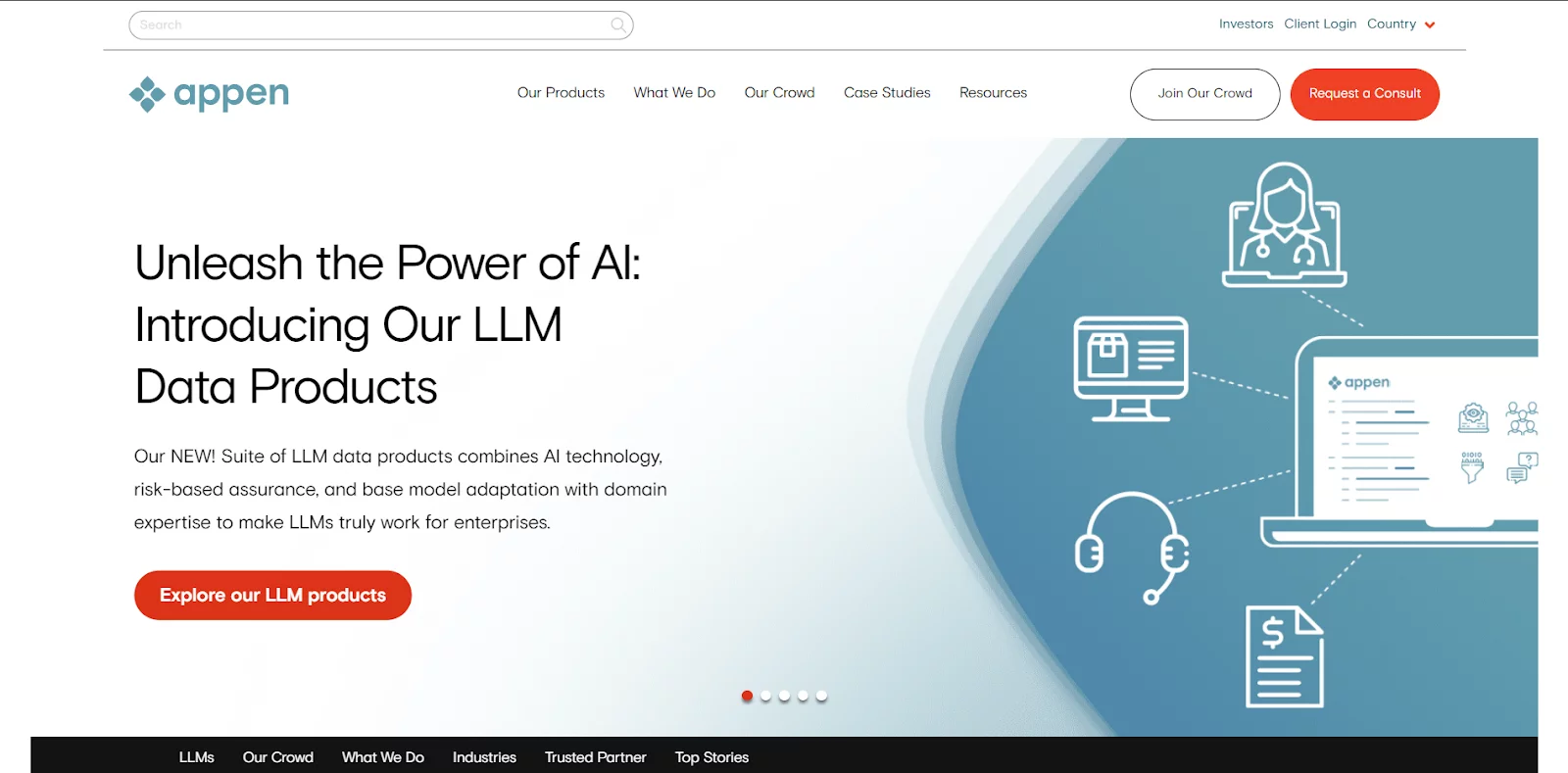
According to a Forbes report, a startling 80% of businesses are actively directing their investments toward artificial intelligence.
Keeping an eye on external events is critical for businesses seeking a competitive advantage. Now, let’s dive in and solve the riddles surrounding AI’s influence on consumer behavior.
AI in market research transforms how we obtain consumer insights by combining the strength of sophisticated algorithms and machine learning. It’s similar to having a knowledgeable assistant who can analyze data, automate surveys, and even decipher the emotions behind client feedback.
Effective research methodology design, interpreting AI-generated insights, and integrating qualitative data and context into analyses are all critical tasks researchers perform.
The best thing about all of this is that AI allows researchers to concentrate on their work’s more creative and strategic facets. Using AI in market research procedures shows a significant advancement in customer insights and business success.
Understanding the Shift to AI-Powered Market Research
Although valuable, traditional market research techniques frequently face difficulties when handling large datasets and deriving complex insights. Artificial intelligence (AI) is a revolutionary technology that analyzes enormous volumes of data at previously unheard-of speeds and reveals patterns and trends that human analysis might miss.
Artificial Intelligence for Product Development:
AI-powered product innovation transforms how companies identify customer needs, create new products, and spur expansion. In the dynamic and competitive market landscape, businesses can gain considerable competitive advantage by embracing AI as a strategic asset in product innovation.
Users can derive help in the sub-sector like predictive analytics, optimized product features, personalization, customization, quality Assurance, and testing.
Enhanced Targeting through AI Algorithms:
AI brings a new level of sophistication to target audience identification. Advanced algorithms analyze diverse data sources, such as customer behavior, demographics, and online interactions, to create detailed profiles. This lets businesses understand their audience granularly, allowing for more precise and effective targeting.
Example: AI algorithms can identify subtle patterns in online behavior, helping businesses tailor marketing messages to specific customer segments, thereby increasing engagement and conversion rates.
Machine Learning Optimizing Targeting Strategies:
Machine learning (ML) algorithms are essential in AI-powered market research. These algorithms learn from historical data, adapt to changing market trends, and predict future behaviors. Machine learning (ML) enables businesses to continually refine their strategies for maximum impact in the context of targeting.
Example: An e-commerce platform can leverage machine learning to predict which products customers will likely purchase based on their past behavior, allowing for personalized product recommendations.
Real-Time Analytics for Prompt Decision-Making:
AI is excellent at providing real-time insights. However, it is not limited to analysis. Now that businesses can access real-time data, they can quickly make decisions. This flexibility is essential in a constantly shifting market where quick decisions translate into the difference between using an opportunity and losing out on it.
Example: During a product launch, a retail brand can use real-time analytics to track social media sentiment and adjust its marketing strategies based on customer feedback.
Personalized Marketing Strategies Powered by AI:
One of the most exciting aspects of AI in market research is its ability to facilitate personalized marketing. By understanding individual customer preferences and behaviors, businesses can create super-personalized campaigns that resonate with their audience on a deep level.
Example: A streaming service can use AI to analyze viewing history and preferences, delivering personalized content recommendations to each user and enhancing the overall user experience.
Ethical Practices and Privacy Considerations:
Privacy concerns must be addressed as AI becomes more deeply woven into market research. Using AI wisely involves putting strong security measures in place to safeguard client data, adhering to data protection laws, and adopting moral behavior.
Employing anonymization strategies and safe data storage procedures allows businesses to protect client privacy while obtaining insightful data.
AI for Creative Agencies
Every successful creative agency is built on creativity, and artificial intelligence (AI) is quickly emerging as a potent ally for fostering original thought and improving the creative process.
Creative agencies can significantly benefit from using AI in their operations and derive benefits like rapid content generation and creativity, visual and design assistance, personalization, targeting, campaign optimization, voice, Natural Language Processing (NLP), data-driven insights, and more.
Scalability for Businesses of All Sizes:
AI-powered market research solutions are designed with scalability in mind. Businesses can integrate AI features that align with their specific needs and budget, whether a small startup or a large enterprise. This adaptability makes AI a feasible solution for organizations of all sizes.
Example: A local bakery can leverage AI-powered analytics to understand customer preferences in its neighborhood, tailoring promotions and offerings accordingly.
The Process of AI in Market Research

With artificial intelligence (AI), businesses can gather, examine, and evaluate enormous volumes of customer data, revealing priceless insights and ultimately changing our knowledge of customer behavior and preferences.
Data Collection: AI-driven technologies gather information from various sources, including social media, surveys, and customer evaluations.
By automating the data collection process, these tools guarantee accuracy and efficiency.
Data Preprocessing: To eliminate noise, inconsistencies, and duplicates, raw data is processed and cleaned.
Tasks involving data preprocessing are handled by AI algorithms, which enhance data quality and save time.
Data Analysis: AI algorithms use cutting-edge methods like natural language processing (NLP) & machine learning (ML) to examine the processed data.
The data is examined for patterns, trends, and correlations that offer insightful information.
Sentiment Analysis: Artificial intelligence algorithms evaluate the tone of user reviews, comments, and social media posts.
Using sentiment analysis, businesses can better understand consumer attitudes and opinions toward their goods and services.
Predictive Modeling: Using historical data, AI models can forecast future consumer preferences, behaviors, and market trends.
Businesses can predict changes in the market and take proactive measures by utilizing predictive modeling.
Reporting and Illustration: AI-powered technologies produce thorough reports and visualizations to convey the results understandably and succinctly.
Charts, graphs, and dashboards are examples of visual representations that help understand and effectively communicate insights.
Decision-Making: Equipped with the knowledge obtained from analysis driven by AI, companies can formulate well-informed choices and successful plans to satisfy customer demands.
Also read: AI-Powered Technologies You Should Know About
Tools for AI-Powered Market Research
Artificial Intelligence (AI) is a field quickly developing in driving innovation. Various potent tools utilize modern AI technologies to empower developers, researchers, and businesses.
Pecan AI

Predictive analytics is Pecan’s primary focus. Developers and researchers can create applications for tasks like text classification, sentiment analysis, and language generation with its pre-trained language models and tools.
Key Features:
- Pre-trained Models: To save time and resources, Pecan provides pre-trained language models that can be adjusted for particular NLP tasks.
- Customization: Pecan’s models can be modified by developers to meet their own needs and to fit their specific datasets and applications.
Poll The People

Poll the People is a good substitute if you prefer SurveyMonkey Genius’ AI-powered feature but lack an audience to survey.
The platform assists users in creating, disseminating, and analyzing the findings of market research surveys by utilizing ChatGPT technology from OpenAI.
Key Features:
- Create surveys by utilizing pre-made templates.
- Choose a panel from the more than 500,000 responders on the platform.
- Use ChatGPT to view, filter, sort, and analyze results.
Appen

Appen is an AI-driven tool with a focus on data collection and annotation. It provides a platform with which companies can hire data annotators and other global crowd workers to complete various data-related tasks like sentiment analysis, image tagging, content categorization, and speech recognition.
Key Features:
Crowdsourcing: Appen gives users access to a skilled and diverse crowd workforce for practical data annotation and collection.
Tools for Data Annotation: The platform provides easy-to-use tools for annotating and labeling data to train AI models.
SurveyMonkey Genius
The SurveyMonkey team trained their AI using information gathered from more than 25 years’ worth of surveys conducted on the site.
You can begin by outlining your survey objectives or utilizing a pre-made prompt from SurveyMonkey.
After that, the AI will produce a fully editable survey for you to check and make changes.
Key Features:
- Provides the ideal question type to use about a topic.
- Creates well-rounded multiple-choice answers that aid in removing bias.
- Helps analyze the sentiment of the answers to open-ended questions
- Draw attention to any patterns in the survey answers you received.
- Assess each response’s quality and remove any that don’t meet your standards for quality or aren’t readable.
Crayon

Crayon is an artificial intelligence tool that makes language generation more dynamic and interactive. It lets developers create interactive storytelling experiences, human-like text generation, and conversational agents.
Key Features:
- Language Generation: Crayon has robust language generation features that make it possible to create lively and exciting dialogues.
- Storytelling Framework: Using this tool, you can create immersive storytelling experiences and interactive narratives.
Conclusion
Marketers can harness the power of big data to enhance audience engagement, expedite market research, and increase overall effectiveness.
As they shift away from pushy, outbound marketing and toward contextual relevance, they can produce content that feels far more natural, relatable, and personal
.
Future-winning marketers can use external data insights about their target audience and industry to guide their next moves.
FAQs
How does AI improve targeting in market research?
AI enhances targeting in market research by analyzing diverse data sources to identify patterns and trends. It helps businesses understand their audience’s preferences, behaviors, and demographics, enabling more precise targeting. This results in much better engagement and higher conversion rates.
What role does machine learning (ML) play in AI-powered market research?
Machine learning is a core component of AI-powered market research. It enables systems to seamlessly learn from data, adapt to changing trends, and make predictions. In market research, machine learning is utilized to identify correlations, predict consumer behavior, and optimize targeting strategies.
How does AI contribute to personalized marketing strategies?
AI enables personalized marketing by analyzing individual customer behaviors and preferences. This information is used to craft targeted campaigns, recommend products, and tailor marketing messages, leading to a more personalized and engaging customer experience.
Are there any privacy concerns associated with AI-powered market research?
Privacy is a crucial consideration in AI-powered market research. To address concerns, adopting ethical practices, complying with data protection regulations, and implementing robust security measures to safeguard customer information is essential.
How can businesses integrate AI-powered market research into their existing processes?
Businesses can integrate AI-powered market research by investing in tools and platforms seamlessly integrating with existing systems. Training teams on AI utilization, fostering a data-driven culture, and seeking expert guidance can facilitate a smooth integration process.
What types of data can AI-powered market research analyze for better targeting?
AI-powered market research can analyze a wide range of data, including customer demographics, online behavior, social media interactions, purchase history, and sentiment analysis. This multifaceted approach provides a holistic view of consumer preferences.



